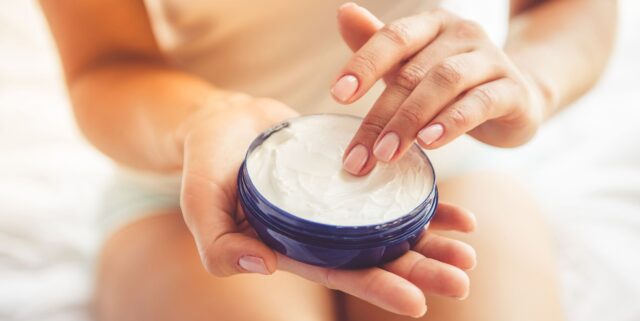
Are you overwhelmed by the vast range of eczema creams available on the market and don’t know which one to choose? Eczema Creams 101: Understanding Ingredients, Formulations & Choosing the Best One is here to help!
In this article, we will provide an overview of all the important information that you need in order to make a well-informed decision. We will discuss different types of ingredients used in creating these products, how they work together to produce various formulations, and ultimately guide you through what makes a good choice for your specific situation.
So if you want clear guidance on selecting an effective cream for treating your eczema symptoms – read on!
Understanding the Different Types of Ingredients in Eczema Creams

When it comes to understanding the different types of ingredients in eczema creams, there are many factors to consider. It is important to know what each ingredient does and how various combinations can work together so that you can choose a cream that best suits your needs.
Common active ingredients include corticosteroids, coal tar, salicylic acid, and vitamin D3, among others; whereas inactive ingredients may range from emollients like petroleum jelly or mineral oil to preservatives such as phenoxyethanol or parabens and fragrances. Each type of ingredient has its purpose and should be carefully evaluated before deciding which eczema cream is right for you.
Comparing Different Formulations of Eczema Creams
When it comes to eczema cream, different formulations contain unique ingredients and offer varying levels of efficacy. To make sure you’re choosing the best one for your skin, it is important to understand how each formulation works differently.
Comparing different formulations can help you identify which type of cream is best suited for your individual needs. First, let’s look at creams with a higher concentration of active ingredients such as corticosteroids or topical immunomodulators.
These types of creams provide more rapid relief from inflammation caused by eczema as well as itchiness associated with the condition. While they may be effective in treating flare-ups quickly, these creams should not be used long-term due to their potential side effects and cumulative nature when applied over time.
On the other hand, there are also milder non-steroidal creams that contain natural emollients like shea butter or coconut oil and anti-inflammatory agents such as oatmeal extract or aloe vera gel. These formulas often provide less intense but longer-lasting results without any negative side effects on the skin barrier function, unlike traditional steroids which can lead to thinning skin if used over an extended period.
Additionally, some manufacturers have developed prescription strength non-steroidal topical treatments specifically designed for those who suffer from severe cases of eczema but still need gentle care for their sensitive skin. Finally, many people turn to home remedies like herbal extracts or apple cider vinegar when looking for relief from symptoms associated with eczema; however, these do not generally form part of a prescribed regimen since their effectiveness has not been proven through scientific research studies yet so caution is recommended here too! Ultimately though – understanding how each type of formulation works differently will help you determine what kind is most suitable for your own needs when looking at treating this chronic condition effectively and holistically to achieve lasting results.
Identifying Your Skin Type and Needs When Choosing an Eczema Cream

When it comes to choosing the best eczema cream, identifying your skin type and needs is essential. Different skin types require different products to maintain healthy, vibrant-looking skin.
Individuals with combination or dry skin will need a moisturizing product that offers hydration without clogging pores. Those with oily or acne-prone skin should look for creams that help balance sebum production as well as combat bacteria and inflammation.
Sensitive skins need calming ingredients such as aloe vera and chamomile to reduce redness while still providing some level of moisture. Understanding all the ingredients found in an eczema cream can be overwhelming at first but ultimately beneficial when deciding on the right product for you.
Many formulas include natural oils like jojoba oil which helps retain moisture while also reducing itching associated with eczema flare-ups; shea butter works similarly by trapping water molecules within the epidermis layer of the skin; sunflower seed oil contains key fatty acids that promote healing and cell regeneration; beeswax provides a protective barrier against irritants; ceramides are naturally occurring lipids which form a protective layer on top of the stratum corneum (outermost layer) helping prevent water loss from underlying cells; zinc oxide acts as a mild astringent, absorbing excess sebum production plus aids in preventing infection from bacterial growth, etc… Once you have identified your individual needs, researched various ingredients found specifically in each formula (eczema creams come in many forms: lotions, ointments, gels, etc…) choosing an effective eczema cream becomes easier!
Tips for Finding the Right Eczema Cream For You
When shopping for an eczema cream, it can be hard to know where to start. After all, there are so many ingredients, formulations, and brands out there! To help narrow down your search and choose the best option for you, here are some useful tips: 1.
Check the Ingredients List – Before buying any product, take a look at its list of ingredients first. Make sure that it’s free from artificial fragrances or preservatives which may irritate sensitive skin further.
2. Consider Your Skin Type – Different people have different skin types which means that different products will work better for them – dry skin might require something richer while oily skin needs something more lightweight. When looking at creams, make sure they are suitable for your particular type of eczema and give special consideration to those with natural oils such as coconut or almond oil which provide extra nourishment without clogging pores or irritating the delicate epidermis layer of the skin.
3. Read Reviews – Often overlooked but incredibly helpful when choosing between similar products is reading reviews from other customers who’ve used them before you – this way you can get honest feedback about how well certain creams worked (or didn’t work) on their cases of eczema before making a purchase yourself! 4.
Speak To A Professional – If in doubt then speak to either your dermatologist or pharmacist who will be able to offer advice on what kind of cream would suit you best based on your symptoms and medical history – they should also be able to tell you whether any over-the-counter treatments could interact adversely with other medications being taken by yourself if applicable too!
Conclusion

It is important to know the ingredients, formulations, and the best cream for eczema when selecting an eczema cream. By understanding what each of these elements means you can choose a product that will help alleviate your symptoms and reduce inflammation.
The selection process may seem overwhelming at first, but with knowledge about the different types of creams available, you can easily find one that best suits your needs. With regular use, the right cream for eczema can provide relief from irritation and discomfort associated with this skin condition.






